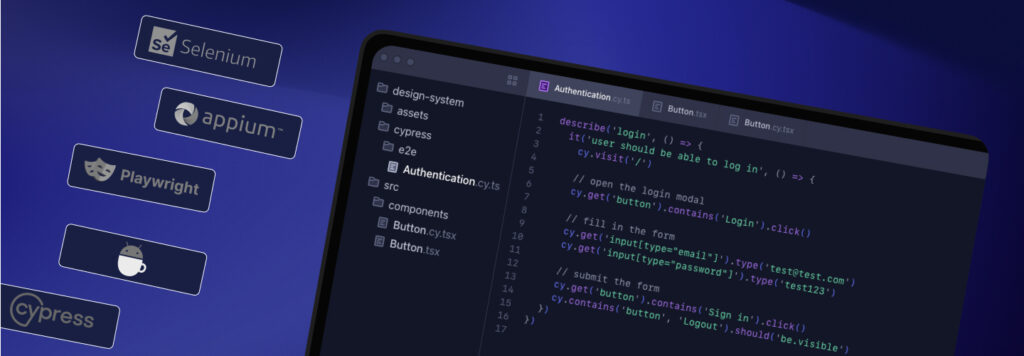<5 Best Automation Testing Tools in 2023>
Overview of QA automation testing
With the landscape of software development becoming increasingly complex, software developers are perpetually under pressure. They need to develop and deliver applications at neck-breaking speed with flawless quality. Automated testing speeds up workflows and makes the QA process highly efficient.
When high-quality apps are developed, automation testing tools have a crucial role. Automation facilitates saving time and money with repetitive testing tasks carried out with high-precision testing tools. These tools help anticipate outcomes, automatically analyze test cases, and help increase the number of tests in the software development landscape. Additionally, good-quality QA automation testing tools result in the development of premium software products.
In the SDLC or the Software Development Lifecycle, Quality Assurance (QA) Testing is an indispensable process. QA is necessary for the software apps to perform their best, have the highest functionality, and let users experience top-quality standards. QA automation testing helps identify and prevent bugs, optimize user experience, enhance performance, and help maintain software security.
Thanks to QA automation testing tools, the entire process of software development, testing, and deployment becomes more efficient with continuous integrationm and delivery.
What to Consider When Selecting An Automation Testing Tool?
While we have listed the top five most reliable and trusted automation software testing tools here, you must consider and evaluate some crucial questions when determining whether a tool satisfies your requirements. Consider the questions as mentioned below:
- Navigation: Whether users can easily navigate different sections of the application.
- Will it be most effective for the test cases?
- Can it be used for testing across different operating systems, devices, and browsers?
- Does it support the programming languages currently being used by the team?
- Is it cost-effective?
- What about the reporting mechanism?
- What about CI/CD integrations that the team might be using?
- Does the tool company offer ample support?
Top 5 Best Automation Testing Tools
1/Selenium
This is the first step to implementing test automation in e-commerce. Before improving products or services on your website, you must study and understand how such updates enhance user engagement/experience. Product analysis seeks to achieve this by providing the developer with information on how users engage with the products.
It also ensures that you provide the perfect products for your target audience. It serves as the yardstick to determine whether your product improvements suit your clients’ needs. That is, automated e-commerce testing checks how well the upgrades meet users’ needs as indicated by the product analytics.
Features:
- The Selenium WebDriver has laid the foundation for open-source testing with various third-party extensions, plugins, drivers, frameworks, and bindings.
- It is compliant with the W3C (World Web Consortium) Standards. Thus, the tool offers uniformity across platforms and enhances compatibility and interoperability.
- The automation testing tool supports multiple software languages, for example, Python, JavaScript, Java, C#, and Ruby.
- It supports almost all commonly used browsers, including Chrome, Internet Explorer, Safari, Firefox, and Opera.
However, developers, testers, and QA experts have faced issues with Selenium. The common feedback about the tool is its speed, inconsistent results, and the complex setup process. However, these cons can be overcome by using Selenium-based frameworks like SeleniumBase, Serenity, Selenide, Selenium BiDi, etc., to name a few. All of these are open-source frameworks.
Business Value: Selenium helps businesses ensure web browser compatibility, enhance code quality, and save time and cost.
2/Appium
Appium is another top-end and commonly used tool in the QA automation industry. It is also open-source, like Selenium, mainly used for mobile apps. Users can write automated User Interface tests for Android, Windows, and iOS using Appium. That’s due to the JSON wire protocol. The tool helps communicate between the Appium Server, the test script, and the actual device of the emulator, wherever the script is run.
Features:
- Tests can be written for web-based, native, and hybrid mobile apps across iOS, Windows, and Android.
- Supports Python, Java, JavaScript, Ruby, Python, C#, PHP, and Perl.
- It can be integrated with other CI/CD tools and testing frameworks.
- Cross-platform testing is possible.
- The test scripts and APIs are reusable.
Appium works best when used with the Appium Inspector. It supports cloud-based testing using BrowerStack’s App Automate.
Business Value: Since it is open source, the tool helps keep automation costs low.
3/Playwright
An automation testing software tool created for end-to-end testing, it offers a single API to testers and developers for web app automation. It is fast and fully capable of meeting the changing needs of the modern online platform. It was launched in 2019 as a fork of Puppeteer and is maintained by Microsoft.
Features:
- Playwright is used for E2E testing.
- It supports all rendering engines like Firefox, WebKit, and Chromium. It is compatible with various platforms like macOS, Linux, and Windows.
- It supports multiple languages.
- It supports test cases across multiple origins, users, and tabs.
- Minimal overhead for complete test isolation.
- Supports multiple selectors, browsers, and mobile emulation.
- Business Value: Playwright helps streamline QA tests and help reduce maintenance overheads.
Check out our unique testing framework
Read more4/Espresso
Another popular framework used for QA automation testing is Espresso. It is generally used for UI testing of apps built with Jetpack Compose. Jetpack, a part of the Kotlin engine, is a suite of libraries that lets Android developers write consistent and good-quality code by following best practices. Developed by Google, the robust Espresso framework is used by QA for Android App testing. It enables automatic synchronization and detection of UI elements. It is easy to use where developers have the chance to create UI tests and they do not require to have advanced skills in programming. The feedback is faster and the workflow is simple.
Features:
- The tool has a simple API.
- It has 3 components – viewMatchers, viewActions, and view Assertions.
- Developed by Google and hence, comes with the promise of reliability.
- Allows black-box testing and simultaneously allows testing of fragments and individual components.
- Can be used for testing native and hybrid views.
- Tests can be written in Kotlin or Java.
- Business Value: The tool is faster than most other frameworks for UI testing. It is also more stable as there is no server communication.
5/Cypress
Developers can use Cypress to write tests for the web. The tool can be set up in less than 60 seconds. A tool that is fast and reliable and focuses on debugging facility. Cypress also focuses on the maintenance cycle. The tool runs inside the browser. It is a complete automation testing tool with a JavaScript-based end-to-end testing framework.
Features:
- It offers a real-time view of tests.
- Simple installation process.
- Runs directly in browsers.
- Interacts with the application to eliminate flaky results.
- It offers cloud-based services.
- An exhaustive library of plugins.
- Offers detailed error messages.
Business Value: Cypress enhances test execution speeds vis-a-vis many other traditional QA automation tools. Businesses can accelerate app development processes and faster time-to-market processes.
Conclusion
Understanding which automation testing tool is the best for your test cases requires insight into how these tools run and operate. Remember, not all teams and situations are the same. Hence, there cannot be any said rule of thumb. The five tools listed here for automation testing are considered the best in the industry in 2023. If you are a front-end developer, Selenium should be your first choice. Similarly, the other tools are excellent for various other testing jobs. It is always good to run a 2-week real-life sprint and involve your entire team to understand if the tool is viable or not.
If you are looking at outsourcing and hiring experts for QA testing, contact WeAreQA, a company that works as a strategic quality partner for clients worldwide.



